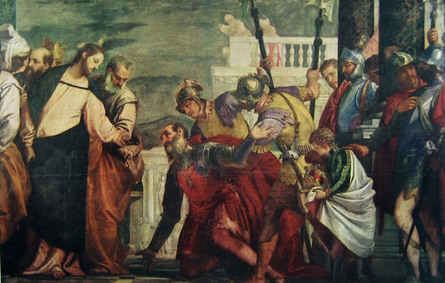Spes Nostra

Monday of the First Week of Advent
Isaiah 4:2-6
Psalm 121: 1-2, 3-4a, 4b-5, 6-7), 8-9 (R. 1)
Matthew 8:5-11
Isaiah’s Gift
Spe Salvi, the Holy Father’s Encyclical on hope can be read as a commentary on the readings given us in the Advent liturgy. In fact, given the timing of the publication of the Encyclical and his own sensitivity to the liturgy, I rather suspect that the Holy Father had just that in mind. The particular gift of the prophet Isaiah is to instill hope into hearts burdened by fear and discouraged by the desolation that seems to surround them on every side. Isaiah’s gift was not for the Jews of the eighth and seventh centuries before Christ alone. Were that the case, the reading of Isaiah in our liturgical assemblies today would be an exercise in literature with no real bearing on our lives here and now. Isaiah’s prophetic gift is for all generations.
God Speaking Here and Now
When the Church reads Isaiah, she receives his message in all its immediacy and freshness for today. This is why we say Deo gratias — Thanks be to God — at the end of a liturgical reading: not because God spoke through His prophet once upon a time, but because God is speaking to us here and now.
The Promises of Christ
What causes hope to spring up in a heart? What makes me hope? What makes you hope? A word of promise. A promise made by one faithful enough and powerful enough to keep it. In a sense, we live in hope because of the promises that have been made to us. Is this not why the Church has us so often pray, “that we may be made worthy of the promises of Christ”? What makes us worthy of the promises of Christ? The hope that we place in them.
The Act of Hope
When I was a schoolboy we used to say the Acts of Faith, Hope, and Charity every day upon our return to class after the noonday break. The Act of Hope made an explicit reference to the promises of God: “I hope . . . because Thou didst promise it.” What are the promises of God to us in today’s First Lesson from the fourth chapter of Isaiah?
2 In that day the bud of the Lord shall be in magnificence and glory,
and the fruit of the earth shall be high,
and a great joy to them that shall have escaped of Israel.
3 And it shall come to pass,
that every one that shall be left in Sion, and that shall remain in Jerusalem,
shall be called holy,
every one that is written in life in Jerusalem.
4 If the Lord shall wash away the filth of the daughters of Sion,
and shall wash away the blood of Jerusalem out of the midst thereof,
by the spirit of judgment, and by the spirit of burning.
5 And the Lord will create upon every place of mount Sion,
and where he is called upon,
a cloud by day, and a smoke and the brightness of a flaming fire in the night:
for over all the glory shall be a protection.
6 And there shall be a tabernacle for a shade in the daytime from the heat,
and for a security and covert from the whirlwind, and from rain.

Promises
I count five promises in just as many verses:
1) a promise of magnificence and glory;
2) a promise of fruitfulness;
3) a promise of great joy;
4) a promise of purification by the spirit of judgment and by the spirit of burning;
5) a promise of protection in every place where the Lord is called upon.
If you believe in these promises, not as a piece of poetic oratory belonging to the past, but as promises made to you, here, today, you will be full of hope. If, on the other hand, you hear them in a ho-hum sort of way and refuse to allow yourself to be touched by them, you are choosing hopelessness over hope.
Domine, non sum dignus
The Gospel is another example of hope springing from a promise. The centurion approached Jesus on behalf of his beloved servant lying at home, sick of the palsy and grievously tormented. Jesus responded immediately with a promise: “I will come and heal him” (Mt 8:7). And then, the centurion made an Act of Hope so splendid that the Church makes us repeat it after him in every Holy Mass just before receiving the Adorable Body and Precious Blood of the Divine Physician: “Lord, I am not worthy that thou shouldst enter under my roof: but only say the word, and my servant shall be healed” (Mt 8:8).
The classic Roman Rite, now happily restored by Pope Benedict XVI, makes us repeat the centurion’s words not once, but three times, striking the breast each time as if to punctuate physically the intensity of our hope — Domine, non sum dignus. . . . . Domine, non sum dignus. . . . Domine, non sum dignus. . . .” This is the pedagogy of the liturgy.
A Happy Life
We have every reason to approach the Holy Mysteries today full of hope if — and I want to emphasize that conditional if — if we take to heart the promises of God made through the mouth of Isaiah in the First Lesson, and through the mouth of Our Lord Jesus Christ in the Gospel. The promises of God surpass anything we can think of or imagine. There is only one way to have a happy life, and that is to have a life filled with hope. And there is only one way to have a life filled with hope, and that is to hear the promises of God and to stake everything on them. That is exactly what Saint Francis Xavier did.
Maria, Spes Nostra
As the model of all hoping Pope Benedict XVI sets before us the Blessed Virgin Mary. In the Salve Regina we call Mary, Spes nostra, our Hope. Why? Not only because she shows us how to hope, not only because her hope is Jesus, our salvation, but also because when we are unable to make the leap of hope, Mary hopes for us. One consecrated to the Immaculate Heart of Mary will never be without hope, because even in the most hopeless situations, the Holy Saturdays of our lives, Mary hopes for us. Let us live this week, then, before the solemnity of her Immaculate Conception, calling her Spes nostra, our Hope, and allowing her to supply for our lack of hope in the glorious promises of Christ.

Spe Salvi, the Holy Father’s Encyclical on hope can be read as a commentary on the readings given us in the Advent liturgy. In fact, given the timing of the publication of the Encyclical and his own sensitivity to the liturgy, I rather suspect that the Holy Father had just that in mind.
He said as much during his homily for First Vespers of the First Sunday of Advent (see the third paragraph).